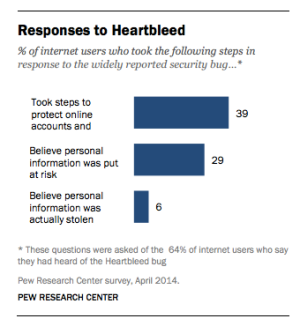Want smarter insights in your inbox? Sign up for our weekly newsletters to get only what matters to enterprise AI, data, and security leaders. Subscribe Now
It appears Heatbleed, the massive OpenSSL security flaw, never really mattered much to the masses.
According to a study by Pew Internet, 39 percent of Internet users surveyed “took steps to protect their online accounts” after learning about Heartbleed security risks. As for the majority 61 percent, they apparently didn’t take any steps “to protect their online accounts by doing such things as changing passwords or canceling accounts.”
For all the shouting from the tech and security industry, a large portion of Internet users remain entirely indifferent to the bug.
Later in its study, Pew claims “29 percent of Internet users believe their personal information was put at risk because of the Heartbleed bug,” while only 6 percent believe their personal data was stolen.
AI Scaling Hits Its Limits
Power caps, rising token costs, and inference delays are reshaping enterprise AI. Join our exclusive salon to discover how top teams are:
- Turning energy into a strategic advantage
- Architecting efficient inference for real throughput gains
- Unlocking competitive ROI with sustainable AI systems
Secure your spot to stay ahead: https://bit.ly/4mwGngO
As with all studies, Pew’s research should be taken with a speck of sand. Studies such as these can successfully suggest trends, but the data within them shouldn’t be interpreted as hard fact.
It’s curious, however, to see that Heartbleed — a bug famous for striking mainstream fears — isn’t as widely cared about as techies may believe.



